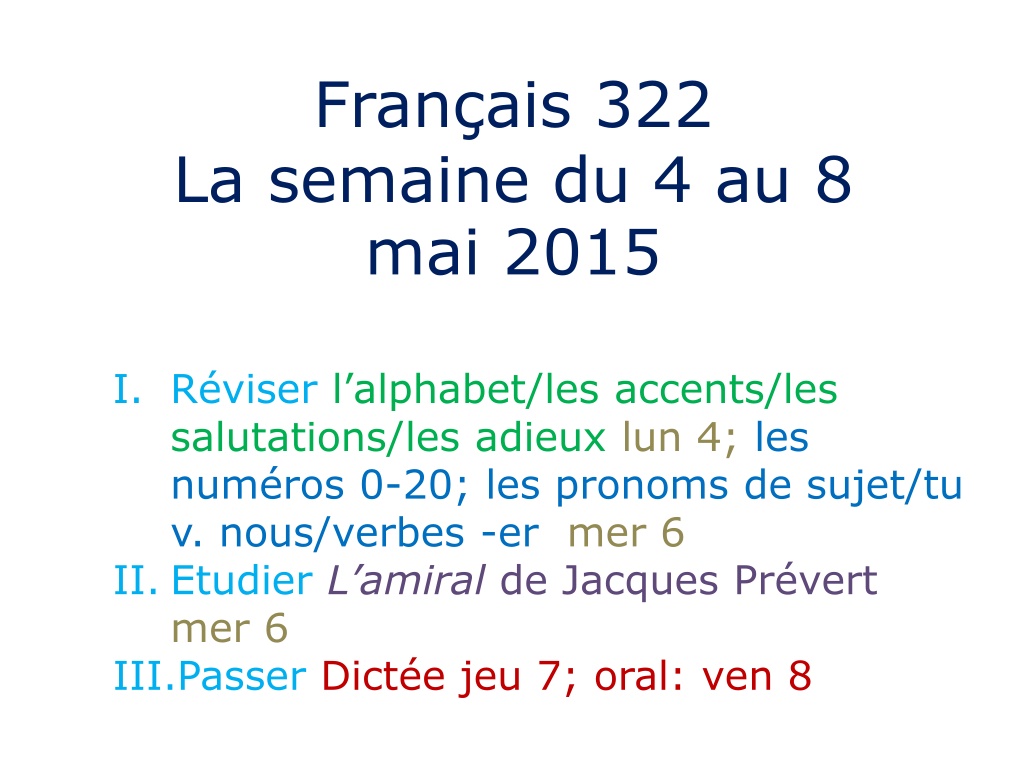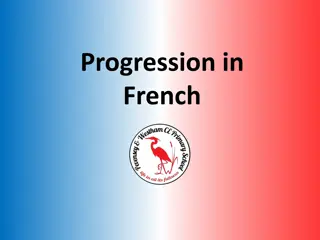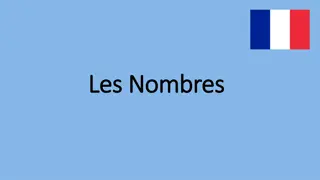French Language Learning Week Overview
The French language learning activities for the week of May 4th-8th, 2015, including revising the alphabet, accents, salutations, farewells, numbers 0-20, subject pronouns, verbs ending in -er, studying a poem by Jacques Prévert, and dictation practice. Images and explanations are provided to help with comprehension.
Download Presentation

Please find below an Image/Link to download the presentation.
The content on the website is provided AS IS for your information and personal use only. It may not be sold, licensed, or shared on other websites without obtaining consent from the author.If you encounter any issues during the download, it is possible that the publisher has removed the file from their server.
You are allowed to download the files provided on this website for personal or commercial use, subject to the condition that they are used lawfully. All files are the property of their respective owners.
The content on the website is provided AS IS for your information and personal use only. It may not be sold, licensed, or shared on other websites without obtaining consent from the author.
E N D
Presentation Transcript
Franais 322 La semaine du 4 au 8 mai 2015 I. R viser l alphabet/les accents/les salutations/les adieux lun 4; les num ros 0-20; les pronoms de sujet/tu v. nous/verbes -er mer 6 II. Etudier L amiral de Jacques Pr vert mer 6 III.Passer Dict e jeu 7; oral: ven 8
Lalphabet a =a b = b c = c d =d e =e f =effe g = g h = hache i =i j =ji k =ka l =elle m =emme n =n o =o p =p q =ku r =erre s =esse t =t u =u v =v w =double ve x =iks y =i grec z =z de
Les accents = e accent aigu tudier = e accent grave = a accent grave tr s Je vais Paris. i = i tr ma na f = o accent circonflexe h tel = c c dille fran ais
Les salutations et les adieux Bonjour! Salut! Allo? a va? Hello! Hi! Hello? (on phone) How are things going? Au revoir. Salut. Ciao. A bient t. Good-bye. Bye. See you. See you soon.
Les numros 0-20 0 = z ro 1 = un 2 = deux 3 = trois 4 = quatre 5 = cinq 6 = six 7 = sept 8 = huit 9 = neuf 10 =dix 11 = onze 12 = douze 13 = treize 14 = quatorze 15 = quinze 16 = seize 17 = dix-sept 18 = dix-huit 19 = dix-neuf 20 = vingt
Tu v. Nous person. It can be used both informally and formally. In French, there are two wordsfor you, tu and vous. Tu is utilized when addressing one person who is friend or family. Vous is utilized when addressing a group of people informally, or one or more people in a formal situation. Here are examples: In English, the word you can refer to one person, or to more than one Tu: Tu joues au foot, Paul? (friend) Tu vas au supermarch , maman? (family member) Vous: Vous allez au cin , les enfants? (informal plural) Comment allez-vous, monsieur? (formal singular) Est-ce que vous voyagez en France, M. et Mme Juin? (formal plural)
Pronoms de sujet (subject pronouns) When we conjugate verbs in French, we typically use the following subject pronouns: je = I tu= you (see previous slide) il = he elle = she on = one, people nous = we vous = you (see previous slide) ils = they [two or more men, or men and women together] elles = they [two or more women]
Verbes er (-er verbs) predictable set of rules: and irregular verbs which do not follow a predictable set of rules. When we learn a new verb, the first thing we do is to conjugate it, meaning to write out the form of verb for je, tu, il, elle, on, nous, vous, ils and elles. The first verbs we generally learn in first year French are regular er verbs. These are so-named because their infinitive form -- - meaning to always ends in er. French verbs fall into two basic categories: regular verbs which follow a Here is the conjugation for parler (to speak, talk): I speak You speak He/she/one speaks We speak You speak They speak Je parle Tu parles Il/elle/on parle Nous parlons Vous parlez Ils/elles parlent = = = = = =























